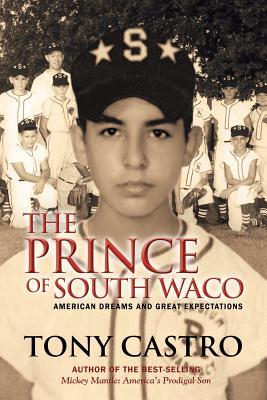In an ideal universe, theirs might have been the perfect love story from two separate worlds. But in the heart of the Bible Belt South, in America of the mid-twentieth century, their young love was forbidden because of their skin color. She was white, lovely, and privileged, growing up in a Tara-like Victorian home. He was Latino, dark-skinned, and working class--the grandson of a Mexican revolutionary who had fought with Pancho Villa. And an innocent waltz at a school May Fete--a waltz that they were not permitted to dance together--came to symbolize their society's racial divide.
In The Prince of South Waco, author Tony Castro narrates his sensitive rite-of-passage memoir of growing up Latino in the segregated South in an age when being different in America often brought the cruel, hard reality of the time, along with heartbreak and despair. He recounts how, as a child in an era before bilingual education and affirmative action, he overcame speech and learning disabilities and an inability to speak English to become an honor student with a penchant for literature, the classics, and writing.
Throughout his youth, he remained discreetly close to the teenage ballerina who had captured his heart. All the while, he encountered ugly warnings of violence and harm--against the two of them--should they see each other and defy the ages-old prohibition in the South against interracial relationships.
A story taking place before the enactment of civil rights legislation, The Prince of South Waco provides insight into the issue of racial discrimination and hate of the times.
Critical Acclaim for Tony Castro's
The Prince of South Waco: American Dreams and Great Expectations
"Readers who step into Tony's Time Machine, The Prince of South Waco, are in for a thrilling, lyrical ride, a true tale of romantic woes and raucous rebellion that will break readers' hearts. Castro's coming-of-age story is a painfully poignant memoir of romance, racism and self-discovery fraught with recollections of lynchings, Jim Crow-ism, no-white-girl speeches, growing up Chicano and excelling as one of the best and brightest of emerging young journalists of his time. 'How do you reclaim your destiny when it has been so connected with a love that has been lost?' asks the author. And therein lies this soulful impasse."
Preston F. Kirk,
formerly of United Press International, Houston
"Tony Castro's honest and powerful memoir captures the essential American story of the struggle for cultural assimilation. The very best stories are written in blood, and in Castro's finely woven personal narrative, the reader can almost feel his heart beating."
Bob Vickrey
Contributing columnist, The Waco Tribune-Herald
